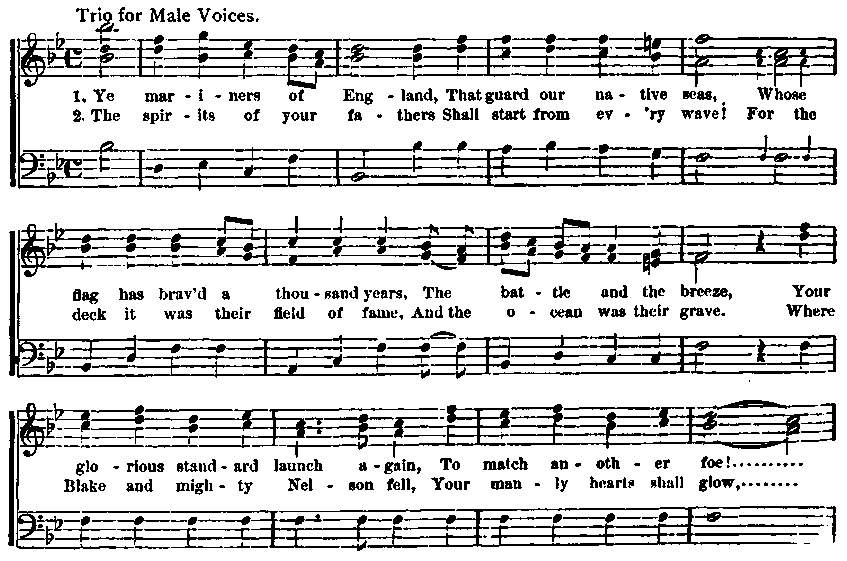Familiar Songs - Their Authors & Histories
300 traditional songs, inc sheet music with full piano accompaniment & lyrics.
| Share page | Visit Us On FB |
|
YE MARINERS OF ENGLAND.
YE MARINERS OF ENGLAND. |
573 |
||
|
In his life of Thomas Campbell, Dr. Beattie says: " Mrs. Ireland, who saw much of Campbell at this time (1799) mentions that it was in the musical evenings at her mother's house that he appeared to derive the greatest enjoyment. At these soirees his favorite song was l Ye Gentlemen of England,' with the music of which he was particularly struck, and determined to write new words for it. Hence this noble and stirring lyric of ' Ye Mariners of England," part of which, if not all, he is said to have composed after one of these family parties. It was not, however, until after he had retired to Ratisbon, and felt his patriotism kindled by the announcement of war with Denmark, that he finished the original sketch, and sent it home to Mr. Parry, of the Morning Chronicler
After Campbell had visited Germany, and met the Irish exiles who had inspired his " Exile of Erin," he returned to London, and thence to Scotland. In Edinburgh he was arrested for high treason, on suspicion of complicity with the Irish exiles. His trunk was seized, but the search through its contents, instead of bringing to light treasonable papers, revealed the first draft of "Ye Mariners of England," which of course amply vindicated his loyalty.
The music of " Ye Gentlemen of England" was composed by John Wall Callcott, who was born at Kensington, England, in 1766. He early developed a fondness for music, and when thirteen years old he attempted composition, and wrote pieces for a private play. He sent one hundred original compositions to compete for a prize offered by the Nobleman's Catch Club. When the club decided to accept but three pieces of a sort, Callcott sent twelve, four of which gained the four medals. By himself he studied French, Italian, Hebrew, and Syriac. He became joint organist of St. Paul's, Covent Garden, and studied instrumental music with Haydn. Dr. Callcott began to compile a musical dictionary, and while proceeding with it, formed a military band for which he composed and arranged the ■ music, and personally drilled the performers. He also wrote a musical grammar. For fifteen years before his death, which took place May 15,1821, his mind was deranged. The music of the song is arranged as a trio for men's voices. |
|||
 |
|||